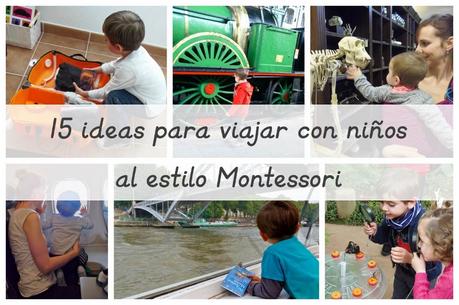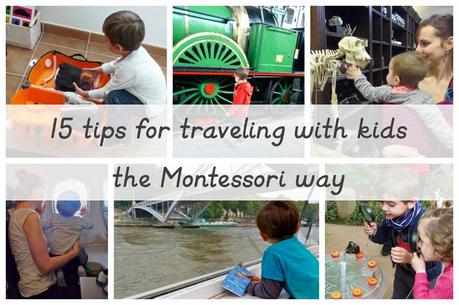
Hoy os traigo algunos tips para viajar con niños, concretamente aquellos que mejor encajan con la filosofía Montessori. En esta recopilación hay ideas que se adaptan a diferentes edades, así que seguro que encontráis algo interesante; si estáis pensando viajar con los peques seguid leyendo!
Antes del viaje
Es una gran idea involucrar a los niños en los preparativos del viaje, de este modo se sentirán partícipes en lugar se sentir que simplemente les llevamos de un lado para otro sin contar con ellos. Además la experiencia les resultará mucho más rica y atractiva si ya tienen una idea de lo que va a ocurrir, del medio de transporte que vamos a utilizar, los lugares que vamos a visitar…
1. Calendario “cuenta atrás”: Explicarles cuándo vamos a viajar e ir marcando en el calendario los días que faltan puede ser muy excitante y les ayuda a comprender el concepto del tiempo (y el concepto de “paciencia”!)
2. Investigar sobre el lugar que vamos a visitar: Puede ser buscando libros en la biblioteca, viendo algún documental, consultando juntos una guía de viajes… Hay muchas maneras de hacerlo! En Montessori siempre se trabaja lo concreto antes que lo abstracto, pero creo que en esta ocasión merece la pena saltárselo
3. Crear juntos un mapa de ruta: Para llevarlo luego durante el viaje, ayuda mucho a los niños a ser conscientes de dónde estamos, cuánto falta para llegar…
4. Lista para hacer la maleta: Con este imprimible es muy fácil para los niños preparar su propia maleta con muy poca ayuda. Nosotros llevamos utilizando esta lista con Alejandro desde los 3 años y le encanta hacerse responsable de esta tarea!
Durante el viaje y en el destino
El viaje puede resultar mucho más ameno si tenemos en cuenta algunos detalles, y durante la estancia también podemos organizarnos de manera que todos disfrutemos y descansemos aunque cada uno tengamos necesidades diferentes!
5. Tener un planning flexible: Siempre es bueno tener un cierto margen, por ejemplo viene bien hacer una lista de aquello que no nos queremos perder y luego otra lista con cosas que nos gustaría hacer pero que son más prescindibles. De este modo podemos priorizar, y si por ejemplo la visita imprescindible del día se nos alarga porque nos resulta muy interesante podemos eliminar de nuestra agenda alguna de las visitas prescindibles.
6. Pequeño arsenal de actividades y entretenimiento para el viaje, las esperas en aeropuertos, restaurantes, etc. En este post de Living Montessori Now hay una buena recopilación de actividades “para llevar” inspiradas en Montessori.
7. Los libros también son un “must”, nosotros siempre llevamos algunos preferidos y alguno nuevo (el efecto novedad es garantía de éxito!)
8. Snacks saludables (y algún as en la manga): Cuando viajamos no siempre podemos controlar los horarios de comidas, así que tener a mano snacks saludables siempre viene bien. Aquí vuelve a funcionar bien el efecto novedad, a nosotros nos gusta llevar cosas que los niños ya conocen y sabemos que les gustan y además alguna sorpresa.
9. Idependencia y orden: Dentro de lo posible conviene mantener en el lugar en el que nos alojemos la sensación de orden e independencia que los niños tienen en casa. Por ejemplo dejarles un espacio en el que puedan tener su ropa y sus cosas a su alcance, intentar que el cuarto de baño les resulte accesible…
10. Diario de viaje: A algunos niños les puede gustar la idea de documentar su experiencia en un diario de viaje. Un sencillo cuaderno puede servirles para dibujar, escribir, pegar recortes de folletos turísticos…
11. Fotografiar: Siguiendo con la idea de documentar el viaje, ofrecer al niño una cámara de fotos sencilla puede ser una gran forma de fomentar su atención por los detalles durante el viaje. Hay cámaras digitales muy asequibles (en este post os enseñé la que tiene Alejandro), y las cámaras desechables también pueden ser una buena opción.
12. Aprovechar las oportunidades de aprendizaje pero sin forzarlo: Está muy bien visitar algún museo o hacer alguna actividad educativa, pero no olvidemos que también se puede aprender mucho simplemente paseando por un pueblo o por el campo, jugando al “veo-veo” en una ciudad que no conocíamos, disfrutando de la gastronomía local…
13. Souvenirs: Algunos pueden convertirse en pequeños tesoros para los niños, es conveniente dejar que elijan ellos mismos dentro de unos límites; por ejemplo en función de su edad podemos explicarles que pueden gastar X dinero en souvenirs y dejar que ellos se administren, o también podemos poner un límite de tamaño para evitar problemas de maletas que no cierran…
A la vuelta
14. Revisar las fotos del viaje: podemos seleccionar las que más nos gustan para crear un álbum, para completar el diario de viaje, o bien para colgarlas en la pared. A los niños les suele gustar recordar anécdotas del momento en que se tomó la foto, o información del objeto que fotografiaron…
15. Profundizar en algún tema que haya resultado de interés durante el viaje: Al igual que hicimos una búsqueda de información antes del viaje, a la vuelta podemos volver a hacerlo pero esta vez centrándonos en aquello que al niño le haya llamado especialmente la atención.
Estas son mis 15 ideas para viajar con niños el camino Montessori, tienes alguna otra sugerencia? Cuéntame en los comentarios!
Te ha gustado?
Compártelo!
O déjame un comentario!
O haz las dos cosas!
——————-

Today I want to share some tips for traveling with children, particularly those that best fit the Montessori philosophy. In this collection there are ideas to suit different ages, so I’m sure you will find something interesting; if you are planning to travel with kids keep reading!
Before the trip
It’s a great idea to involve children in the planning, so they will feel they’re contributing instead of being taken from one place to another without being asked. In addition, the experience will be much richer and more attractive if they already have an idea of what will happen, the means of transport you will take, the places you will visit …
1. Calendar “countdown”: We can explain them when we will be traveling and mark in the calendar the days left. It can be very exciting and helps them understand the concept of time (and the concept of “patience”!)
2. Research the destination: May be looking for books in the library, watching a documentary, consulting a travel guidebook together… There are many ways to do it! In Montessori we always work concrete before abstract, but I think this situation is a good exception to skip it
3. Create a roadmap together: To carry during the trip, as it helps children to be aware of where we are, and to avoid (or at least reduce) the “are we there yet?”
4. List to pack: This printable makes it very easy for children to pack their bag with very little help. Alejandro has been using it since he was 3 and loves to take responsibility for this task!
Journey and destination
The journey can be much more enjoyable when you consider some details, and during the stay we can also organize ourselves so that we all enjoy and rest although everyone has different needs!
5. Have a flexible planning: It’s lways good to have a margin, for example we can make a list of what we do not want to miss and then another list of things we like to do but are more expendable. Thus we can prioritize, and if for example the must-see of the day takes longer than expected because we find it very interesting we can eliminate some of our expendable activities from our agenda.
6. Small array of activities and entertainment for the journey, waiting in airports, restaurants, etc. In this post at Living Montessori Now there is a good collection of activities “to go” inspired by Montessori.
7. Books are also a “must”, we always take some favourites and some new (novelty effect is the guarantee of success!)
8. Healthy snacks (and some surprises): When we travel we can not always control meal times, so having healthy snacks at hand is always welcome. Here again the novelty effect works well; we like to pack things that our kids already know and like and also some surprises.
9. Idependencia & Order: As far as possible we should keep in the place where we stay the sense of order and independence that children have at home. For example give them a space where they can have their clothes and things at their reach, try that the bathroom is accessible to them …
10. Travel Journal: Some children may like the idea of documenting their experience in a travel journal. A simple notebook can serve for drawing, writing, pasting tourist brochures…
11. Photograph: Continuing with the idea of documenting the journey, giving the child a simple camera can be a great way to promote their attention to detail during the trip. There are very affordable digital cameras (in this post I showed the one Alejandro has), and disposable cameras can also be a good choice.
12. Encourage learning opportunities without forcing them: It is very nice to visit a museum or do some educational activity, but do not forget that kids can also learn a lot by simply walking through a town or in the countryside, playing “I spy” in a new city, enjoying the local cuisine …
13. Souvenirs: Some may become small treasures for children, and we can let them choose themselves within limits; for example depending on their age we can give them a budget to spand on souvenirs and let them manage it, or we can set a size limit in order to avoid suitcase-closing problems…
Back home
14. Check the photos of the trip: we can select our favourites to create an album, to complete the travel journal or to hang on the wall. Children usually enjoy remembering anecdotes of when the photo was taken, or information about the photographed object…
15. Research a topic that has been of interest: As we did before the trip we can do it again when we’re back, but this time focusing on what has particularly caught the child’s attention.
This are my 15 tips for traveling with kids the Montessori way, do you have any other suggestions? Please share in the comments!

